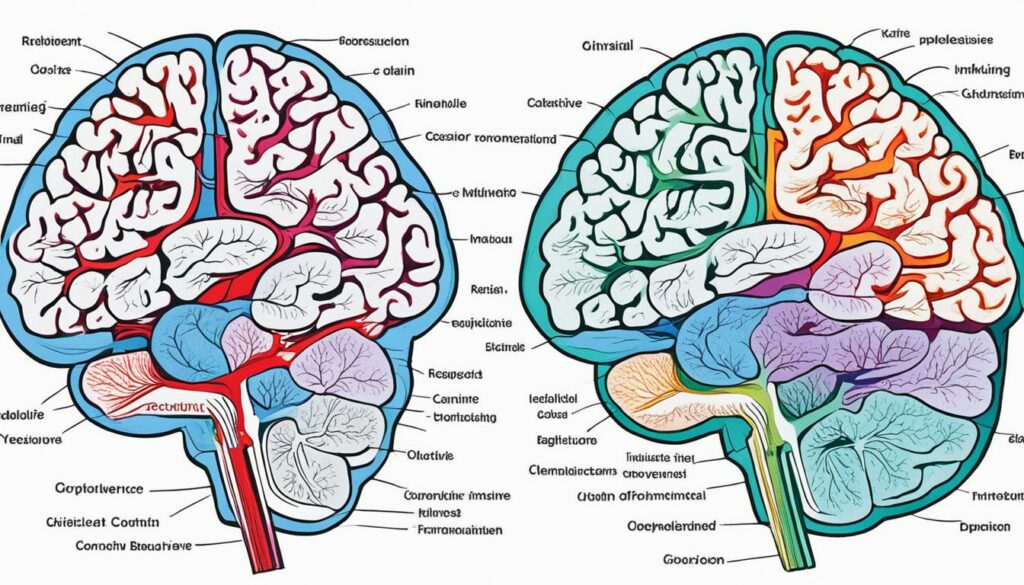Understanding Why Teens Rebel – A Closer Look
Teenagers often display behaviors that can be concerning to parents and may lead to conflicts within the family. These behaviors, known as teenage rebellion, can include underage drinking, smoking, slipping grades, and expressions of anger towards parents and authority figures. However, it is important to recognize that a certain level of rebellion is a normal part of the adolescent developmental phase.
Adolescence is a critical time when teens are navigating the bridge between childhood and adulthood. They are in the process of forming their self-identity and seeking autonomy. This article will delve into the reasons behind teenage rebellion and provide guidance on how parents can effectively navigate these challenging behaviors.
Key Takeaways:
- Teen rebellion is a normal part of adolescent development.
- Understanding the reasons behind teenage rebellion can help parents navigate these behaviors effectively.
- Adolescence is a time when teens are seeking autonomy and developing their self-identity.
- Teen rebellion can include behaviors such as underage drinking, smoking, and expressing anger towards parents and authority figures.
- Parents can provide guidance and support by maintaining open communication and setting appropriate limits.
The Desire for Independence
One of the main reasons why teens rebel is their desire for independence. During adolescence, teenagers find themselves caught between being viewed as children who still need guidance and being burdened with adult expectations. This internal struggle often manifests in rebellious behavior as a way for teens to assert their autonomy and individuality.
When parents question their choices or impose restrictions, it can feel like an attack on their desire for freedom, leading to explosive responses. Teens want to make their own decisions, explore their interests, and navigate the world on their own terms. Parental rules and guidelines may be perceived as limitations to their independence, causing a natural inclination to rebel against them.
Additionally, adolescents are highly influenced by their peers and strive to fit in and be accepted by their social circles. The pressure to conform to what is considered “popular” or “cool” among their generation can further fuel their desire for independence and rebellion. They may adopt certain behaviors, styles, or attitudes simply to assert their individuality and differentiate themselves from their parents.
| Factors Influencing Teen Rebellion | Effects on Adolescent Behavior |
|---|---|
| Desire for independence | Exploration of personal identity |
| Peer pressure and the need to fit in | Adoption of behaviors for social acceptance |
| Struggles with parental expectations | Rejection of perceived limitations |
“Teenagers want to assert their independence and create their own identities. Their rebellion is often an expression of their desire for autonomy and freedom.”
Understanding the desire for independence is crucial in managing and guiding rebellious teens. By acknowledging their need for autonomy and respecting their perspectives, parents can engage in meaningful conversations and provide support in a way that nurtures their growth while ensuring their safety and well-being.
Struggle for Acceptance

During adolescence, teenagers often find themselves engaged in a constant struggle for acceptance, seeking to fit in with their peers. The desire to belong is a powerful driving force that can lead them to imitate the behaviors and lifestyles of their friends. This pressure to conform can sometimes result in a rebellion against parental values and expectations, causing conflict within the family.
The need to fit in can be so strong that teenagers may risk losing their own individuality in order to feel like a part of the crowd. They may make choices or engage in activities that they normally wouldn’t, simply to gain acceptance from their peers. This can be particularly challenging for parents who may disapprove of their teenagers’ choices and find themselves in disagreement with their child’s behavior.
“Teenagers often undergo a struggle for acceptance and want to fit in with their peers.”
It is crucial for parents to understand that this struggle for acceptance is a normal part of teenage development. While it can be difficult to witness their rebellion, it is essential to approach the situation with empathy and understanding. By recognizing the importance of belonging and the influence of peer pressure, parents can foster open communication with their teenagers and work towards finding a middle ground that allows them to maintain their individuality while also feeling accepted by their peers.
“The desire to fit in with peers can sometimes lead teenagers to rebel against parental values and expectations.”
Parents can play a vital role in helping their teenagers navigate this struggle for acceptance. By fostering a supportive environment at home and encouraging open discussions, parents can provide their teenagers with a safe space to express their thoughts and emotions. H3: Practical Tips for Parents
- Listen actively to your teenager’s concerns and experiences. Create opportunities for them to share their thoughts and feelings without fear of judgment.
- Empower your teenager to make their own decisions within reasonable limits. This allows them to develop their own identity while still providing structure and guidance.
- Encourage your teenager to build a diverse network of friends. By engaging with a variety of individuals, they can expand their horizons and embrace different perspectives.
- Help your teenager identify their unique strengths and talents. Focusing on their individual strengths can boost their self-confidence and reduce the need to conform to societal expectations.
- Model acceptance and respect within the family. By demonstrating acceptance of diversity and individuality, you set an example for your teenager and reinforce the importance of embracing one’s authentic self.
Table: Comparison of Parenting Approaches
| Authoritarian Approach | Permissive Approach | Authoritative Approach |
|---|---|---|
| Strict rules and expectations | Lack of clear boundaries | Firm but flexible boundaries |
| Little communication or explanation | Uninvolved parenting | Open and supportive communication |
| High demand for obedience | Limited guidance or discipline | Encourages autonomy and independent thinking |
By acknowledging and addressing the struggle for acceptance that teenagers experience, parents can navigate their teenagers’ rebellious behaviors with patience and understanding. It is through open communication, support, and unconditional love that parents can guide their teenagers towards a healthy balance between fitting in and staying true to themselves.
Seeking Attention
Many teens crave attention, and this can manifest in attention-seeking behavior that may lead to rebellious actions. When teenagers feel that they are not receiving enough attention from their parents, they may resort to seeking it from other sources. This can include engaging in risky behaviors, seeking validation from peers, or acting out in ways that are disruptive or attention-grabbing.
It is crucial for parents to provide the necessary support and show unconditional love to their teens. By making them feel secure and valued, parents can help fulfill their attention-seeking needs in a positive manner. By offering guidance and maintaining open lines of communication, parents can encourage their teenagers to seek attention in healthy ways rather than resorting to negative behaviors.
“Attention seeking is not necessarily a negative trait. It is essential for parents to redirect their teen’s attention-seeking behavior towards productive outlets and positive activities.”
Building a strong bond with their teenagers is crucial for parents. By actively engaging in their lives and taking an interest in their interests and achievements, parents can help meet their attention needs in a healthy and constructive way. By providing regular positive attention, parents can significantly reduce attention-seeking behaviors and foster a sense of security and validation in their teenagers’ lives.
Parental support and attention play a vital role in shaping teenagers’ behavior and overall well-being. By providing the necessary love and attention, parents can mitigate attention-seeking behaviors and guide their teens towards making positive choices.
Effective Strategies for Dealing with Attention-Seeking Behavior
| Strategy | Description |
|---|---|
| Active Listening | Show genuine interest in your teen’s thoughts and feelings. Give them your undivided attention when they are talking to you. |
| Encourage Hobbies and Talents | Support your teen’s interests and provide opportunities for them to explore their passions. This can help divert their attention towards positive activities. |
| Spend Quality Time Together | Plan regular family activities where you can engage as a unit. This helps create a strong bond and ensures your teen feels valued and included. |
| Praise and Acknowledge Efforts | Recognize your teen’s achievements and positive behavior. This boosts their self-esteem and reduces the need for attention-seeking actions. |
| Set Clear and Consistent Boundaries | Establish rules that are fair and consistent. Let your teen know the limits and consequences of their actions. |
| Seek Professional Help if Necessary | If attention-seeking behavior becomes persistent or extreme, consider consulting a mental health professional for guidance and support. |
Risk-taking Behavior

The extensive physical and hormonal changes that teenagers go through can lead to risk-taking behavior. They may engage in risky activities as a way to gain acceptance among their peers or to seek attention. This experimentation allows them to push boundaries and learn from their mistakes. The teenage brain is still developing, and the frontal lobe responsible for judgment and decision-making is not fully formed. This can result in disproportionate reactions and poor choices.
Impact of Brain Development

During adolescence, the brain undergoes significant development, which can have a profound impact on a teenager’s behavior and decision-making abilities. Research has shown that the emotional centers of the brain develop before the frontal lobe, which is responsible for rational thinking and decision-making. This developmental imbalance can lead to heightened emotional reactions and impulsive behavior in teenagers.
Teenagers may struggle to regulate their emotions and make sound judgments, often relying more on their emotions rather than logical reasoning. This can contribute to rebellious behaviors as they may not fully consider the consequences of their actions.
Understanding the impact of brain development is crucial for parents when navigating their teen’s rebellious behaviors. It helps foster empathy and patience, as parents recognize that their teenagers are still in the process of developing the necessary skills for effective decision-making.
By acknowledging and validating their emotions, parents can create a supportive environment that encourages open communication and helps teenagers gradually develop the ability to regulate their emotions and make better choices.
Hormonal Changes

Hormonal changes play a significant role in teenage rebellion. During adolescence, teenagers experience a surge of hormones that can cause drastic changes in their thought processes and mood demeanor. These hormonal shifts can impact their behavior and contribute to the rebellion often associated with this phase of development.
One specific hormonal change that occurs during adolescence is the increase in testosterone levels in boys. Testosterone is a hormone that is responsible for the development of male physical characteristics, but it also influences behavior. As testosterone levels rise, boys may exhibit more aggressive behavior, which can manifest as rebellion against authority figures and defiance of rules.
In addition to testosterone, other sex hormones and neurotransmitters also have a significant impact on brain functions and mood regulation. These hormonal fluctuations can contribute to mood swings and impulsive actions in teenagers. The interplay between hormones and brain chemistry further intensifies the emotional and behavioral changes experienced during this period of development.
| Hormonal Changes in Teenagers | Impact on Behavior |
|---|---|
| Increase in testosterone levels in boys | More aggressive behavior and defiance |
| Fluctuations in sex hormones and neurotransmitters | Mood swings and impulsive actions |
The relationship between hormonal changes and teenage rebellion highlights the complex interplay between biology and behavior during adolescence. Understanding the impact of these hormonal shifts can help parents and caregivers approach their teens with empathy and patience, recognizing that these changes are a natural part of the developmental process.
By acknowledging the influence of hormones on mood and behavior, adults can provide the necessary support and guidance to help teens navigate through this challenging phase. Effective communication, setting boundaries, and providing a safe and nurturing environment are crucial in assisting teenagers in managing their emotions and making sound decisions.
Parenting Strategies
When it comes to dealing with teenage rebellion, it’s important for parents to approach the situation with understanding and effective strategies. Rather than reacting with impatience or defensiveness, maintaining a calm and respectful attitude can go a long way in fostering open communication with your teen. Punishments often prove ineffective, so instead, focus on setting appropriate limits and guiding your teen towards making good choices for themselves.
Discussing rules and boundaries with your teenager while considering their perspective can help them feel heard and understood. This fosters a sense of mutual respect and allows for healthy dialogue. By providing support and unconditional love, you create a safe space for your teen to express themselves while learning from their mistakes.
“Parenting is about guiding, not controlling. When we set limits for our teenagers, we should do so in a way that is respectful and considers their growing autonomy.”
Maintaining a Bond
An essential aspect of effective parenting during the rebellious teenage years is maintaining a strong bond with your teen. This bond acts as a foundation for trust and can help navigate challenging behaviors. Spend quality time with them, engaging in activities they enjoy or simply having open conversations. Building a connection based on trust and understanding will make them more receptive to your guidance and less likely to engage in negative behaviors.
Setting Limits
Setting appropriate limits is crucial in providing structure and guidance for your teenager. Clearly communicate your expectations and enforce consequences when necessary. However, it is important to strike a balance between setting limits and allowing autonomy. Give your teen the opportunity to make decisions for themselves within safe boundaries, facilitating their growth and decision-making skills.
A table showcasing effective parenting strategies:
| Parenting Strategies | Description |
|---|---|
| Stay calm and respectful | Maintain a composed demeanor and treat your teen with respect, even in challenging situations. |
| Set appropriate limits | Create boundaries that allow your teen to make choices within safe parameters. |
| Communicate and listen | Engage in open and honest conversations, actively listening to your teen’s perspective. |
| Provide support and love | Show unconditional love and support, making your teen feel valued and secure. |
| Maintain a bond | Focus on building and nurturing a strong bond with your teen through quality time and shared activities. |
By implementing these parenting strategies, you can effectively navigate the challenging terrain of teenage rebellion. Remember, the goal is to maintain a healthy bond, foster open communication, and guide your teen towards making positive decisions. With patience, understanding, and love, you can successfully navigate the rebellious years and support your teen’s growth into a confident and responsible adult.
The Positive Side of Rebellion
Rebellion can have several positive effects on teenagers. It allows them to express their opinions and engage in mature conversations with their parents. By having the opportunity to voice their thoughts and ideas, teenagers develop a sense of empowerment and agency over their own lives.
Furthermore, rebellion plays a vital role in cultivating independence. Through pushing boundaries and challenging authority, teenagers develop the confidence to make decisions on their own. They learn to think critically, consider different perspectives, and assert their individuality. This process of self-discovery is essential for personal growth and the development of a strong sense of self.
It is important to recognize that rebellion is not inherently negative. By allowing teenagers to rebel and make mistakes, they learn valuable life lessons and gain a deeper understanding of the consequences of their actions. These experiences contribute to their emotional and intellectual development, equipping them with the skills needed to navigate the complexities of adulthood.
The Importance of Expression
Expression through rebellion provides teenagers with a platform to explore their identity and values. By questioning societal norms and challenging the status quo, they develop a critical mindset and the ability to think independently. This fosters creativity and innovation, encouraging them to find their own unique path in life.
“The greatest discoveries and achievements in human history were often the result of individuals who dared to rebel against conventional wisdom and think outside the box.” – Albert Einstein
To nurture the positive effects of rebellion, it is crucial for parents to maintain a healthy bond with their teens based on trust, respect, and open communication. Encouraging dialogue and actively listening to their perspectives allows teenagers to feel valued and acknowledged, fostering a supportive environment for growth and self-expression.
Cultivating Independence
Independence is a fundamental aspect of teenage development, and rebellion serves as a catalyst for cultivating this essential trait. By encouraging teenagers to make their own choices and take responsibility for their actions, parents provide them with valuable life skills. Through trial and error, teenagers learn to navigate the complexities of decision-making, gaining confidence and resilience along the way.
It is important for parents to strike a balance between guidance and freedom, allowing teenagers the space to grow while offering support and guidance when needed. This balance helps foster healthy autonomy and prepares teenagers for the challenges and responsibilities they will face as adults.
Conclusion
Adolescent rebellion is a normal part of the developmental journey, and understanding the underlying reasons behind these behaviors can help parents navigate this challenging phase effectively. The desire for independence and the struggle for acceptance are common drivers of teen rebellion. As parents, it is important to maintain a strong bond with your teenager, set appropriate limits, and provide consistent support and guidance.
Approaching teenage rebellion with empathy and open communication can make a significant difference. By listening to your teen’s perspective and acknowledging their need for autonomy, you can foster a deeper understanding and connection. It is crucial to create an environment where your teenager feels heard, respected, and valued.
Additionally, setting clear boundaries and expectations can help teenagers establish a sense of structure and responsibility. By involving them in rule-making and decision-making processes, you can empower them to make thoughtful choices while still providing necessary guidance.
Remember, parenting during the rebellious teenage years is a journey. Embrace the challenges, stay patient, and continue to prioritize your relationship with your teenager. By implementing these parenting tips and strategies, you can navigate the complexities of adolescent rebellion and help your teen successfully transition into adulthood.
FAQ
Why do teenagers rebel?
Teenagers rebel as a part of their developmental phase, primarily because they desire independence and autonomy. They want to make their own decisions and may view parental rules as restrictions on their freedom. Additionally, they may rebel to fit in with their peers and gain acceptance, seek attention, or engage in risk-taking behavior.
How can parents handle teenage rebellion effectively?
When dealing with teenage rebellion, it is important for parents to stay calm and treat their teens with respect. Instead of imposing punishments, it is more beneficial to set appropriate limits and guide them in making good choices. Open communication, understanding their perspective, providing support, and modeling healthy relationships and decision-making are crucial in handling teenage rebellion effectively.
Is teenage rebellion normal?
Yes, teenage rebellion is a normal part of adolescent development. It is a way for teenagers to express their opinions, engage in mature conversations, and cultivate independence. Through rebellion and making mistakes, they learn the consequences of their actions and develop a strong sense of self.
How can parents navigate the challenges of teenage rebellion?
To navigate the challenges of teenage rebellion, parents should try to maintain a bond with their teens, set appropriate limits, and provide support and guidance. They should approach teenage rebellion with empathy, open communication, and understanding, allowing for a deeper connection with their teenagers during this transitional phase.
What are some strategies for effectively parenting rebellious teenagers?
Some strategies for effectively parenting rebellious teenagers include staying calm and treating them with respect, setting clear and reasonable expectations, providing support and unconditional love, promoting open communication and understanding, and modeling healthy relationships and positive decision-making. It is important to establish a balance between guidance and independence, while also considering the teenager’s perspective.






